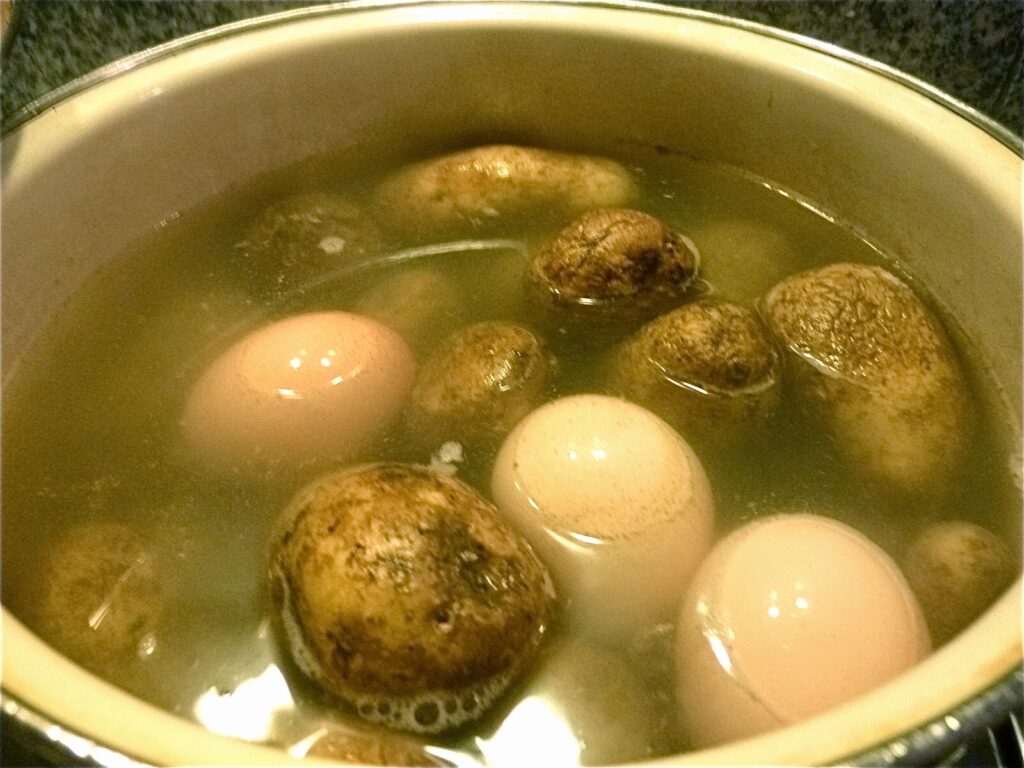The phrase “the same boiling water that softens the potato hardens the egg” is often used metaphorically to highlight how individuals respond differently to difficult situations or circumstances.
In this analogy, The potato represents someone who becomes softer, more vulnerable, or weakened when exposed to challenging conditions. Like a potato that softens in boiling water, this person might become more pliable or emotionally affected in tough situations.
The egg symbolizes someone who becomes tougher or stronger when faced with adversity. Similar to an egg that hardens in boiling water, this person might become more resilient, maintaining inner strength or resilience despite challenging circumstances.
The analogy emphasizes that identical circumstances can affect different individuals in contrasting ways, revealing the diversity of human responses to challenges. It also suggests that one’s response to difficult situations can depend on individual characteristics, experiences, and mindset.
What Does the Boiling Water Analogy Symbolize?

The boiling water analogy is a metaphorical representation of how people respond differently to challenging situations. It draws a parallel between two common food items potato and egg placed in the same boiling water yet reacting differently. Boiling water signifies adverse or difficult circumstances in life.
The fundamental concept here is that identical external conditions affect different individuals in contrasting ways. Just as boiling water impacts the potato and egg differently, life’s challenges can bring out diverse responses and reactions from people.
Symbolism of the Potato and the Egg
Potato
In this analogy, the potato represents individuals who tend to become softer or more vulnerable when faced with difficulties. When boiled, a potato softens and becomes more pliable.
Similarly, some individuals might emotionally soften, feeling more sensitive or impacted by challenges. They may adapt by becoming more accommodating or open to change.
Egg
Conversely, the egg symbolizes individuals who exhibit resilience or strength in the face of adversity. When boiled, an egg becomes hardened. Similarly, certain people become more resilient, stronger, or less affected by difficult situations.
They might maintain their inner strength, firmness, or determination even amidst challenging circumstances.
How the Metaphor Relates to Human Experiences
This metaphor reflects the diversity of human responses to adversity. It emphasizes that external circumstances alone do not determine one’s reaction; rather, individual characteristics, experiences, and mindsets significantly influence responses. It highlights the variability in human nature and the complexity of emotional reactions when encountering challenges.
Moreover, it invites contemplation on personal resilience and vulnerability, encouraging individuals to understand and embrace their unique responses to adversity while fostering empathy and understanding towards others’ reactions.
Overall, it serves as a poignant reminder of the multifaceted nature of human experiences and the importance of acknowledging diverse responses to life’s trials.
How Do Individual Responses to Adversity Differ?
These examples and psychological perspectives demonstrate the intricate nature of human responses to adversity, highlighting the diverse ways individuals cope with and adapt to challenging situations based on their unique traits, experiences, and mental frameworks.
Individual Differences in Reacting to Challenges
Factors Influencing Responses
Different personality traits, such as introversion/extroversion, agreeableness, or neuroticism, can significantly influence how individuals respond to challenges. For instance, an extroverted person might seek social support during tough times, while an introvert might prefer solitary reflection.
Previous life experiences shape an individual’s coping mechanisms. Those who have overcome past adversities might exhibit more resilience, while others might struggle more if they lack prior experience in handling difficult situations.
A person’s mindset, whether growth-oriented or fixed, impacts their approach to adversity. Those with a growth mindset tend to view challenges as opportunities for learning and growth, fostering resilience, while a fixed mindset might hinder adaptive responses.
Psychological Perspectives
Resilience refers to an individual’s ability to bounce back or adapt in the face of adversity. It involves factors like emotional regulation, problem-solving skills, social support, and optimism.
Adaptability signifies the capacity to adjust and thrive in changing circumstances. It involves being flexible, open-minded, and willing to embrace new strategies or perspectives when facing challenges.
What Defines Resilience and Vulnerability in Adversity?

Resilience and vulnerability in adversity can be defined in several ways:
Resilience
Resilience refers to the ability to bounce back, adapt, and recover from setbacks or adversities. It’s not merely about enduring challenges but also about growing stronger and learning from difficult experiences.
Resilience involves maintaining a positive attitude, employing effective coping mechanisms, and utilizing personal strengths to navigate through hardships. It includes emotional toughness, adaptability, problem-solving skills, social support, and a positive outlook even in the face of adversity.
Vulnerability
Vulnerability, on the other hand, refers to the state of being exposed, open, or susceptible to emotional, psychological, or physical harm or stress. In adversity, vulnerability can manifest as a feeling of fragility, insecurity, or exposure to negative influences.
It involves acknowledging one’s weaknesses, insecurities, or limitations, and being open to the possibility of being emotionally affected or harmed by challenging circumstances.
FAQ’s
Does boiling water harden the egg?
No, boiling water doesn’t directly harden the egg. Instead, it denatures the egg’s proteins, causing them to coagulate and solidify.
What happens when you add an egg to boiling water?
Adding an egg to boiling water initiates the denaturation of proteins in the egg whites and yolks, leading to their coagulation and the solidification of the egg.
Why do you add salt when boiling potatoes?
Salt is added to boiling water when cooking potatoes to enhance their flavor and create an osmotic balance that helps the potatoes retain their shape and texture.
Why is boiling eggs so hard?
Achieving the desired consistency without overcooking eggs involves precise timing due to the complexity of controlling the coagulation of egg proteins to reach different textures—soft, medium, or hard-boiled yolks.
How do you hard-boil an egg without water?
Are there alternative methods to hard-boil eggs without using water?
Hard-boiling eggs without water can be done using alternative methods such as microwave cooking, oven baking, or specialized egg cookers that utilize steam.
How does salt affect the boiling time of eggs?
Salt increases the boiling point of water, requiring more heat to reach boiling temperature. This hotter water cooks the eggs more rapidly by accelerating protein coagulation at higher temperatures.
Final Words
The analogy of boiling water, affecting potatoes and eggs differently, encapsulates the diverse human responses to adversity. It mirrors life’s challenges, illustrating how individuals react uniquely: some soften like potatoes, becoming more vulnerable, while others toughen akin to eggs, exhibiting resilience. This metaphor underscores that external circumstances don’t dictate responses; personal traits, experiences, and mindsets play pivotal roles.
It urges contemplation on individual resilience and vulnerability, fostering empathy and understanding. Reflecting human complexity, it celebrates diverse reactions to trials. Understanding these varied responses, influenced by traits and life experiences, emphasizes the intricate nature of resilience and vulnerability amidst life’s boiling waters.

